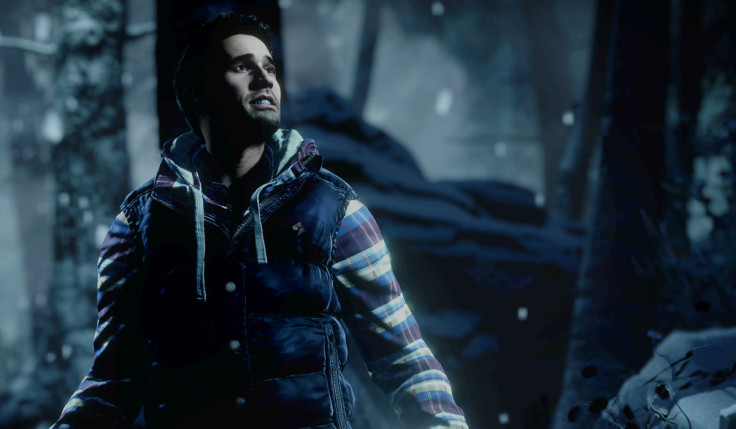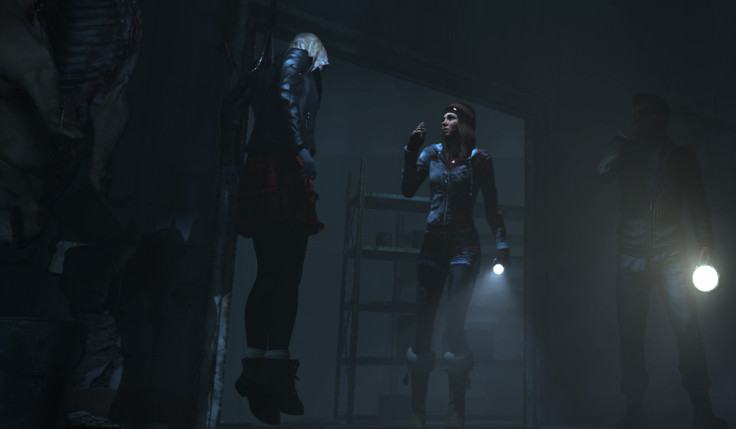Until Dawn: One of the best written horror games and well worth playing this Halloween

As Halloween approaches, Ed Smith discusses one of the surprise hits of 2015.
When I played Heavy Rain back in 2010, there were a few occasions when, due to screw ups on my behalf, central characters died. Heavy Rain promised that no matter what happened the story would morph to fit the player's actions – if someone was killed, no matter how important they were, the story would bend to fit around it and every play through, even if it ended in tragedy, was valid. As it turned out, that was nonsense.
There were no pop-ups or written messages telling me that since FBI agent Norman Jayden had died in my game, I had ruined the story, but everything about the game from the way characters looked and spoke, to the many plot threads that were left hanging after his death, tacitly informed me that I had blown it. Heavy Rain punished me for letting characters die. It said it wouldn't, but in dozens of implicit ways, it let me know it was disappointed.
Until Dawn, from Supermassive Games, isn't like that. I consider it a small miracle of video game writing that, even if everyone in the game dies, it still feels like the proper, unspoiled story. It works because it's a slasher – when a group of good-looking teenagers goes to an isolated cabin in the woods you expect people will die.
So when someone dies in Until Dawn it feels absolutely right, whereas Heavy Rain gave me this pit-of-the-stomach feeling of guilt. Despite its accommodating pretence, I knew there was a correct and incorrect way to play. When someone dies in Until Dawn, I just feel like "well, yeah, of course." Instead of a slap on the wrist, it's an inflection on the story. In murder mysteries like Heavy Rain, the FBI agent never gets killed. But in slasher movies like Until Dawn, this is what happens.
It's Until Dawn's smartest move. Heavy Rain director David Cage tries to copy movies, but he's influenced largely by the kind of genre flicks where everything is neatly tied up in the end. Fahrenheit is a Matrix-esque adventure, Heavy Rain's a thriller, and Beyond: Two Souls is a teen/superhero film. Rather than the chaos and probable bleakness that comes from letting the player control who lives and who dies, these are the sorts of stories where everything proceeds – to a certain extent – safely. You know who's supposed to win and who's supposed to lose. If your interactions get in the way of that, you can't help feeling like you've messed it up.

In slashers though, anything goes. There's always the horny one who dies first and the sensible woman who'll probably make it, but it's much more of a crap shoot. Drew Barrymore dies in Scream. Samuel L. Jackson is killed in Deep Blue Sea. Any of the characters in slasher films can die and it doesn't feel jarring. Until Dawn works for the same reason. When you make a mistake it doesn't feel like a mistake – in fact, it isn't a mistake. Repurposed this way, slashers are exactly the right kind of genre to suit video games' inherent unpredictably.
[Character spoilers for Until Dawn follow]
Until Dawn also gives us Mike, one of the best video games characters in years. Brett Dalton's performance is fantastic. He manages to make Mike seem at once insufferable but loveable; imperilled but light-hearted; funny but serious; capable but clumsy. He's not exactly Faust, but Mike is nuanced and multi-faceted in a way video game characters rarely are - he's more than just a cool outfit, a trademark weapon and a job description. He starts out the unbearable, inevitable jock, doomed to be killed in the first half hour after heading into the woods for some nookie, but becomes the game's hero, heart and comic relief.
He constantly surprises you too. Despite the many, many instances where Mike can die, he always pulls through, and celebrates his survival with a bashful smirk. He has this endearing curiosity about everything that happens in Until Dawn, making him one of the few video game characters who I genuinely want to spend time with. And most importantly, he has an arc – he's not the same character at the end of the game as he is at the beginning. After cracking gay jokes to Matt and Emily at the start, Mike quickly develops into a mature, practical and likeable guy.
Video game writing is in a sorry state. Aside from developing new superpowers and maybe a few scars, even across several sequels, characters barely change. But Mike undergoes a transformation. You feel very differently about him once the credits roll.
For me, he's up there with Joel from The Last of Us – in fact, he's even better. Joel also has the rare honour of being a character in a video game for whom you genuinely feel, and who changes and develops as the story goes on, but I always get a sense of smugness and knowing from The Last of Us's writers. That game's largely written around Joel, and seems determined to point out and unpack his psychology. It's a noble effort, but heavy-handed. Mike on the other hand develops very naturally. He doesn't have many big character moments, where it's explicit that the writers are trying to define him, but he's still thoroughly characterised.
Its source material, the slasher genre, isn't synonymous with quality writing, but Until Dawn uses it terrifically. I've not played a game that feels more honest to the idea of branching narrative, nor have I enjoyed the company of a character more than Mike Munroe.
For all the latest video game news follow us on Twitter @IBTGamesUK.
© Copyright IBTimes 2025. All rights reserved.






















